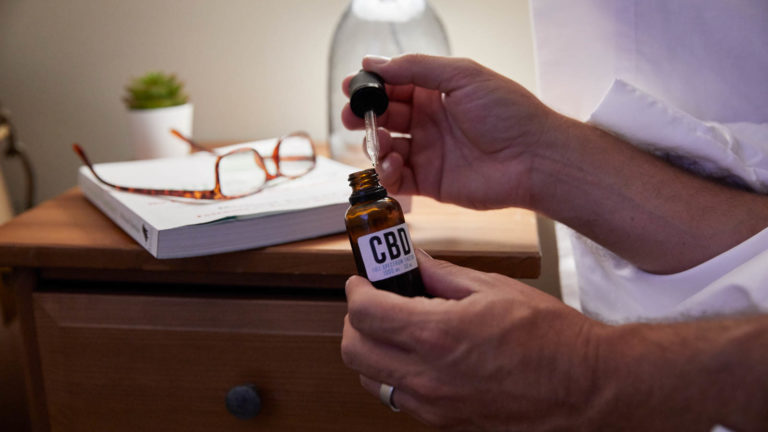Major depressive disorder is the leading cause of disability among Americans aged 15 to 44. It affects approximately 7% of Americans per year, as well as more than 300 million people worldwide. While this condition can develop at any age, the average onset is 32 years old; it is more prevalent in women than in men.
Since antidepressant medications first became available in the 1950s, many other options have become available, including talk therapy and relaxation techniques. Medication continues to be a leading course of treatment but non-pharmaceutical treatment is important as up to 40% of patients with depression are “treatment-resistant” — meaning their symptoms do not improve after trying a minimum of two antidepressant medications.
 Photo by: Gina Coleman/Weedmaps
Photo by: Gina Coleman/WeedmapsImage lightbox

Cannabidiol (CBD), particularly CBD-rich cannabis oil, as a tool in the fight against depression is now a key area of interest for consumers and researchers alike.
Research overview
Numerous animal models have shown that CBD may yield great psychiatric potential, offering anti-anxiety and antidepressant-like properties. The effect of CBD on serotonin 1A receptors may be key to these potential benefits.
A growing body of research suggests that deficiencies in the endocannabinoid system (ECS) may produce depressive responses. Clinical and preclinical data suggest that cannabinoid receptor signaling may be an ideal target for developing new pharmacotherapy options for both anxiety and mood disorders.
The studies
A 2018 study stated that available antidepressant medications have a significant time lag in terms of therapeutic response and are often relatively inefficient. Their goal was to study whether CBD could induce rapid, yet sustained, antidepressant-like results in male rodents bred to develop depression-like symptoms.
After a single dose, acute antidepressant effects were observed within 30 minutes. Also occurring was an increase in brain-derived neurotrophic factor (BDNF), which is a protein that plays a critical role in mood disorders. The researchers concluded that CBD offers a promising therapeutic profile as a potential fast-acting antidepressant treatment option.
 Photo by: Gina Coleman/Weedmaps
Photo by: Gina Coleman/WeedmapsImage lightbox

Another 2018 study, conducted on mice, examined in the mechanisms of CBD-induced antidepressant-like effects, investigating the role of serotonin and noradrenaline. Researchers found that CBD likely improves symptoms of depression through the action of serotonin. When CBD was administered with a serotonergic, or any agent that modifies the effects of serotonin, a synergistic effect was observed.
What the experts say
Dr. Bonni Goldstein, medical director of California-based Canna-Centers and a subject matter adviser for Weedmaps, said she knows of anecdotes of people who said they used CBD to treat depression. “Preclinical animal data reports that CBD can have antidepressant effects. There are many anecdotal reports of patients using CBD successfully to treat depression but clinical trials in humans are lacking,” said Goldstein, who is also author of “Cannabis Revealed.”
“For example, one middle-aged man who found the side effects of antidepressants to be intolerable, experiencing insomnia and decreased sexual function, started using low doses of a 4:1 CBD:THC tincture. He self-reported a 90% improvement of his depression symptoms with no side effects,” she said.
 Photo by: Gina Coleman/Weedmaps
Photo by: Gina Coleman/WeedmapsImage lightbox

"There is scientific evidence to suggest that CBD has antidepressant-like effects,” Rosalia Yoon, Ph.D., a Research Scientist for Apollo Cannabis Clinics in Ontario, Canada, told Weedmaps. “From a neurophysiological perspective, the endocannabinoid system (ECS) is known to modulate functions associated with cognition, mood, sleep, pain, reward, and motivation; and decreased ECS activity has been postulated to account for some of the symptomatology associated with depression, such as low mood, anhedonia, anxiety, and decreased pain tolerance.”
While studies are limited, “Most of the evidence on the mood regulatory effects of CBD comes from pre-clinical studies. CBD has been demonstrated to exert dose-dependent antidepressant-like effects in animal models of depression in various rodent species,” Yoon explained. “Of note, CBD appears to exert acute antidepressant effects, suggesting that it may confer temporal advantages over standard antidepressant medications, for which the onset of action typically occurs 6-8 weeks after initiation of treatment. Further, research has shown that a single dose of CBD has effects lasting up to one week in rodents, suggesting sustained antidepressant effects.”
Yoon also acknowledged the limits of medical research.
“Admittedly, evidence on the antidepressant effects of CBD in humans remains inconclusive due to a scarcity of randomized, controlled trials, and the evidence comes mostly from anecdotal accounts or evaluation of depression as a secondary measure,” Yoon said. “In other studies of cannabis, antidepressant effects have been ascribed to THC. For instance, THC and/or synthetic THC has been reported to elicit an elevated mood in healthy subjects, chronic pain patients, and among those living with bipolar affective disorder.
“Considerably more human studies need to be conducted in order to fully understand the benefits of CBD in relation to mood regulation. Nevertheless, given the positive pre-clinical evidence and the high safety index of cannabis, CBD holds promise as a therapeutic aid in the management of depressive symptomatology. It should be noted that drug-drug interactions, as well as issues of tolerability and safety with long-term use, are not yet fully understood. As such, CBD should always be used under the care and guidance of a medical doctor, especially when it pertains to the management of mood disorders," she said.
Bottom line
Overall, anecdotal reports offer insight, as many patients have reported relief following treatment with CBD-rich cannabis products. These products are increasingly being used to treat symptoms of depression, and research indicates cannabinoids may support a more comprehensive, long-term recovery treatment plan.
In preclinical animal studies, CBD has been shown to offer antidepressant-like effects, yet clinical trials are lacking. While CBD shows promise as a potential antidepressant treatment, more research is required in humans.

